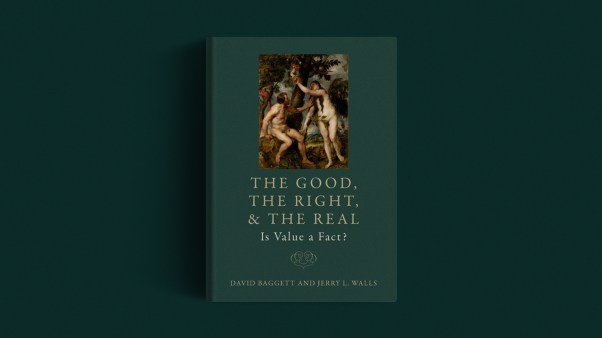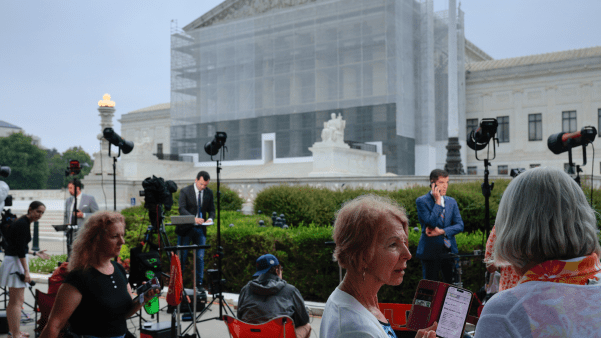Ayn Rand changed my life. When I embraced her philosophy, Objectivism, the conversion was far more dramatic than my decision, several years later, to follow Jesus Christ—more dramatic, but in the end transitory. Yet Rand, the novelist, philosopher, and uncompromising atheist, inadvertently opened a door for the gospel. I don't believe dead people spin in their graves, but if they did and she could read these words, I imagine Rand would be twirling violently.
As many have noted, Rand's ethic of rational self-interest is incompatible with the gospel, and leads to social as well as spiritual disaster. "Most observers see Rand as a political and economic philosopher," wrote Gary Moore last year in Christianity Today. "I believe that she was first and foremost an anti-Christian philosopher." A six-foot dollar sign wreath towered over her casket, Moore pointed out, an icon of the false gospel she labored to proclaim. I agree entirely that Christianity and Objectivism are utterly incompatible. But my gratitude to Rand remains profound.
My First Conversion
In the spring of 1962, an awkward and philosophically oriented 15-year-old raised in an utterly secular home, I read The Fountainhead and then Atlas Shrugged. Those books triggered a philosophical (and, unknowingly, spiritual) revolution. One evening, immersed in Rand's writings, I listened on the radio to a re-broadcast of a lecture she had delivered a year earlier at the University of Wisconsin, during a symposium called "Ethics in Our Time." Even at a distance of 48 years, I can still hear her heavily accented voice as she quoted from John Galt's speech, the long and detailed summary of Objectivism that appears near the end of Atlas Shrugged: "Yes, this is an age of moral crisis. Yes, you are bearing punishment for your evil …. Your moral code has reached its climax, the blind alley at the end of its course. And if you wish to go on living, what you now need is not to return to morality … but to discover it."
For three years I followed Rand, read every word she published, studied Objectivism and its moral, political, and economic implications, and even tried to imitate the heroes in Rand's novels. Several times, the central character in The Fountainhead, Howard Roark, is accused of staring at people, his piercing eyes making the novel's villains feel judged and found wanting. And so I practiced widening my eyes and keeping them open for extended periods. No one, however, seemed daunted by my gaze.
Because my family lived in New York City, I was able to enroll in a 20-session "Basics of Objectivism" course at the Nathaniel Branden Institute. (Branden, an early Rand associate and a psychologist by training, spent many years teaching Objectivism in partnership with Rand.) The course included sessions on metaphysics, epistemology, ethics, aesthetics, and political and economic theory, with a heavy emphasis on laissez-faire capitalism. When Branden finished his lecture, Rand herself would often answer questions. Among the memorabilia from that period of my life is a scrap of paper with Rand's autograph, the letters sharp and angular. I also enrolled in "Objectivist Economics," taught by a very young Alan Greenspan.
My commitment to Rand and her philosophy, however, did not survive my early years in college. Two figures intervened.
The Unscrupulous God
The first was Plato. In Rand's teaching, Aristotle served as a kind of philosophical hero. Plato, with his tendency toward mysticism, represented philosophical depravity for Rand. So I entered college predisposed to reject Plato, and came armed with Objectivist and Aristotelian weapons for the battle. Then I actually read Plato in a philosophy class. I was shocked to find much to commend his vision of a Reality that is more than the reality we can see. "A young man who wishes to remain an Atheist," C. S. Lewis wrote in Surprised by Joy, "cannot be too careful of his reading. There are traps everywhere—'Bibles laid open, millions of surprises,' as Herbert says, 'fine nets and stratagems.' God is, if I may say it, very unscrupulous."
The Phaedo was particularly disturbing, as Plato's Socrates prepares to die and in the process comforts his friends with an admittedly non-Christian notion of the afterlife. What troubled me most was that it made sense, that the one-dimensional universe of Objectivism did not do justice to the facts. Could Rand be wrong? My certainty began to crumble. Much later I stumbled onto a hymn that points to Plato and Socrates as unwitting precursors of the gospel:
For Socrates who, phrase by phrase,
Talked men to truth, unshrinking,
And left for Plato's mighty grace
To mold our ways of thinking;
For all who wrestled, sane and free,
To win the unseen reality,
To God be thanks and glory.
I still remember my breathlessness as I read the Phaedo for the first time. But Plato merely set the stage for something, Someone, more profound.
The second figure was Jesus. In my sophomore year, I enrolled in a two-semester "Bible as Literature" course. I was majoring in ancient history, and biblical history figured into the wider picture. But the ground softened by Plato presented itself to the plow of the gospel, and I was changed forever.
The process, however, has its own bizarre twists and turns. These courses were taught by a former pastor turned agnostic, a delightful and humorous man who enjoyed introducing conservative Christians to historical-critical methods and shaking their faith. Students often emerged from Bible as Literature predictably unbiblical in their perspective. For reasons known only to the Holy Spirit, the system didn't work in my case. Reading the Bible for the first time, encountering the text and laying aside the professor's debunking attitude, I met a God who laid claim to my life, a Savior who invited (or, more precisely, demanded) my allegiance.
Over the course of two semesters, something happened. I can't precisely date it. But friends tell me that they noticed a change. By the time I was halfway through the New Testament course, I was referring to Jesus in the present rather than the past tense. Later, under the guidance of those same friends, I learned the vocabulary—about committing my life to Jesus, receiving him as Savior, following him as Lord. Paul describes the experience of his Corinthian converts, and my own experience, with overwhelming and almost inarticulate joy: "You were washed, you were sanctified, you were justified in the name of the Lord Jesus Christ and in the Spirit of our God" (1 Cor. 6:11, RSV). But the deed was first done surreptitiously, as I read the Bible and met the One who is King of kings and Lord of lords. Lewis was right: God is indeed very unscrupulous.
The Truth of Ayn Rand
And what of Rand? I quickly relegated her to my intellectual and spiritual past. Friends from my Objectivist period drifted out of my life. As a new Christian, I immersed myself in the Bible, Christian literature, and the Christian community. Only occasionally, in the intervening decades, did Rand enter my consciousness—once again with the recent release of the movie Atlas Shrugged. In reflecting on how she inadvertently influenced me, I've seen God's hand work through her in a number of ways.
Ayn Rand taught me how to think. "Man cannot survive except through his mind," says Howard Roark in The Fountainhead. "He comes on earth unarmed. His brain is his only weapon. Animals obtain food by force. Man has no claws, no fangs, no horns, no great strength of muscle. He must plant his food or hunt it. To plant, he needs a process of thought. To hunt, he needs weapons, and to make weapons—a process of thought. From this simplest necessity to the highest religious abstraction, from the wheel to the skyscraper, everything we are and we have comes from a single attribute of man—the function of his reasoning mind." And so Rand challenged me to reject sloppy thinking, to apply reason meticulously, not least when dealing with culturally mandated assumptions. But that very commitment to reason gave me tools that led, much to my surprise, to a critique of Objectivism itself. The unseen Reality to which Plato pointed made sense not simply as an alternative way of seeing the world, but also under the test of reason.
Indeed, that very test points to God himself. The order and complexity of creation, the fact, as Lewis notes in Mere Christianity, that there seems to be a moral law with a claim upon human beings ("right and wrong as a clue to the meaning of the universe," he calls it), all stand upon the foundation of the firm application of reason. Rigorous thought can set the stage for faith and demonstrate the reasonableness of the Christian claim that Jesus Christ is King of kings and Lord of lords. While reason cannot, unaided, present the fullness of Christian truth, it can support and undergird it.
Ayn Rand taught me that there is such a thing as objective reality. Three Aristotelian axioms—Non-Contradiction, Either-Or, and A is A—mark the three sections of Atlas Shrugged. "Contradictions do not exist," Francisco tells Dagny. "Whenever you think that you are facing a contradiction, check your premises. You will find that one of them is wrong." In other words, a thing is true (or false) regardless of what we think about it. This flies in the face of modernism (which tends to dismiss out of hand the supernatural and the miraculous, with no evidence beyond skepticism) and postmodernism (which doesn't so much reject the supernatural as completely relativize it). When a postmodernist says, "All truth is relative; you have your truth and I have mine," Rand, and I, might answer: Your very statement contains an inherent inner contradiction. You claim as objective truth an assertion that would, in effect, negate itself.
All of this, in the end, led me to the non-sentimental and objective claims of the gospel. The gospel is no mere preference. It is true, or it isn't. Jesus is who he says he is, or he is (again, Lewis) a madman or a fraud. Christian doctrine—Creation, Fall, Incarnation, Redemption, Consummation, and our ultimate and beatific vision of the Trinity—is true, or false. It can't be both. Rand's view of objective reality is admittedly limited. She relies on the senses and goes no further. She dismisses faith as mysticism and its practitioners as witch doctors. But she is right in this: If something is true, it is so because it aligns with reality. Our desires neither confirm nor deny its validity. Our only choice is to say "Yes" to truth, or not. As a Christian, that "Yes" is to Truth incarnate, Jesus Christ.
Ayn Rand taught me to believe in moral absolutes. Gary Moore reserved his strongest criticism precisely for this aspect of her thought. Rational self-interest, taken to its logical conclusion, is ultimately destructive. "I am done with the monster of the 'We,' " the hero of Anthem says, "the word of serfdom, of plunder, of misery, falsehood and shame. And now I see the face of god, and I raise this god over the earth, this god whom men have sought since men came into being, this god who will grant them joy and peace and pride. This god, this one word: 'I.' " The golden calf of Exodus 32 hardly receives the adulation that Rand pours upon the individual and his or her moral autonomy.
John Galt's oath in Atlas Shrugged puts it more sharply: "I swear, by my life and my love of it, that I will never live for the sake of another man, nor ask another to live for mine." Rand places each human being at the center of his or her own universe, and makes that human being absolute. This is, from a biblical perspective, monstrous, the very articulation of Adam and Eve's disastrous rebellion.
As destructive as her moral vision may be, however, it is a moral vision—and that is precisely the point. I came to believe, in my Objectivist years, that I would flourish if I lived my life in accordance with a set of clear and unmistakable moral precepts. Later, I realized that those precepts were wrong; they work precisely against the flourishing of human beings as God has designed us and are ultimately self-destructive.
Rand's view of objective reality is limited. She relies on the senses and goes no further. She dismisses faith as mysticism. But she is right in this: If something is true, it is so because it aligns with reality.
But in rejecting Objectivist ethics, I discovered that the New Testament offers us a "more excellent way" (1 Cor. 12:31, RSV). The New Testament vision of discipleship involves the attempt (aided, empowered) to bring our lives in accord with God's revealed will and purpose. There are moral absolutes with which we must grapple, which we must obey, and about which (when we fail to obey) we must seek absolution. Just as there is objective reality, there is also right and wrong. The twisted moral vision of Rand prepared me, perhaps simply by contrast, for the values of the kingdom of God.
Ayn Rand taught me about humanity's heroic destiny. Her four novels are dominated by great heroes: Kira Argounova, Howard Roark, Hank Reardon, Dagny Taggart, John Galt, and the unnamed narrator of Anthem who finally calls himself Prometheus. Critics dismiss these heroes as plastic, one-dimensional, unbelievable. They are probably right. Gary Cooper's version of Howard Roark in the movie rendition of The Fountainhead demonstrates how difficult it is to portray a hero with no flaws, no inner conflicts. Cooper simply couldn't pull it off, and the role is stilted. But as a young Objectivist, I had people to imitate, an ideal to live up to: "I want to be like that." Rand incarnated her moral precepts, defective as they are, in her heroes.
So, of course, do the Bible and Christian tradition. Unlike the heroes of Rand, the Bible rarely portrays its chief characters as relentlessly good. Abraham tried to pass off Sarah as his sister. David committed adultery and murdered his rival. Peter is coward and rock, thoughtful evangelist and impulsive motor mouth. Paul's teaching provides for all time the essential infrastructure of our Christology, but his temper (to take one example) bursts out of his writings with disturbing power. Yet in all of these characters, flawed as they are, we see God at work, correcting them, calling them, drawing them to himself, transforming them. "I want to be like that."
Only and finally in Jesus do we see humanity as the Father intends it. And only and finally in Jesus can our humanity ultimately be transfigured. "It does not yet appear what we shall be, but we know that when he appears, we shall be like him, for we shall see him as he is" (1 John 3:2, RSV). Our heroic destiny is fulfilled in Christ, whom we shall gaze upon eternally. Even now, while our transformation is still incomplete, we have "put on the new nature, which is being renewed in knowledge after the image of its creator" (Col. 3:10, RSV).
There is little in Ayn Rand's philosophy or worldview that a Christian can endorse, even in small ways. Moore is right; Rand is "first and foremost an anti-Christian philosopher," and Objectivism stands in painfully stark contrast to the gospel. Yet I wonder if I am alone in offering thanks for Rand and her role, inadvertent as it was, in Christian conversion. God can use a donkey to chastise a prophet. Can he also use Rand as a kind of waystation on the road to Christ?
In my more hopeful moments, I find myself wondering if Rand, in her last moments, perceived her error and turned to the One she had rejected all her life. Or, as she slipped into eternity, if Jesus made a final, undeserved, and awe-full offer of grace. But that is speculation, and well beyond what God intends us to know. It is sufficient for my own purposes simply to say: Thank you, Ayn Rand.
Edward S. Little II is bishop of the Episcopal Diocese of Northern Indiana, and author of Joy in Disguise: Meeting Jesus in the Dark Times (Morehouse, 2009).
Copyright © 2011 Christianity Today. Click for reprint information.
Related Elsewhere:
Gary Moore wrote earlier about why Christians should be wary of Ayn Rand and her disciples.
Previous articles on conversion or testimony include:
Testify! | In nightclubs, coffeehouses, and iPods, true first-person storytelling is becoming a cultural force as it borrows from Christian tradition. (January 7, 2011)
Bearing True Witness | Why we are tempted to embellish conversion stories. (June 28, 2010)
What Conversion Is and Is Not | Hint: It's not just about getting people 'saved.










